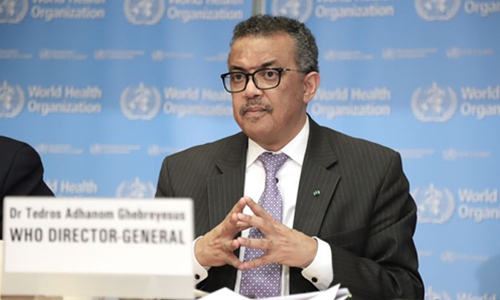DPP ‘behind Taiwan ghostwriters’
By Fan Lingzhi Source:Global Times Published: 2020/4/19 22:53:41
Separatists spread anti-Chinese mainland sentiment online

WHO Director-General Tedros Adhanom Ghebreyesus speaks at a daily briefing in Geneva, Switzerland on March 9. Photo: Xinhua
Since early April, World Health Organization (WHO) Director-General Tedros Adhanom Ghebreyesus suffered cyber violence on social media networks and his Twitter account is now still filled with sarcastic and abusive comments with a considerable number originating in Taiwan.
Pro-Chinese mainland experts based in Taiwan said that the comments were left by Taiwan's "internet water army" sponsored by the separatist political party - Democratic Progressive Party (DPP), which is now ruling the island.
The experts said they were familiar with individual incidents being used to hype anti-Chinese mainland sentiment and inciting conflicts between the Chinese mainland and other countries.
They said the DPP stigmatized and smeared anti-separatist KMT candidates in the Taiwan regional election in January 2020.
"Taiwan people rarely use Twitter. We like Facebook more," a Taiwan-based resident, who asked for anonymity, told the Global Times, adding that because of this, it was abnormal to see that many Taiwan accounts on Twitter. Many accounts were registered just in April.
"Abuses, or racist comments, giving me names, black or Negro… this attack came from Taiwan," Tedros told reporters in a press briefing from WHO's Geneva headquarters on April 8.
The terms like "Negro" seldom show up on internet platforms like Twitter as it would cause international public outrage. But Chinese mainland analysts said such abuse was "quite common" on PTT, the largest terminal-based bulletin board system in the island of Taiwan, with its core theme hyping hatred against the Chinese mainland.
But Chinese mainland analysts said such abuse was "quite common" on PTT, the largest terminal-based bulletin board system in the island of Taiwan, with its core theme hyping hatred against the Chinese mainland.
A Taiwan political commentator with the pen name ROCky who requested anonymity told the Global Times that "so-called cyber warriors, or internet ghostwriters, of Taiwan's green camp [pro-separatist camp], have some favorite themes in their propaganda plan in the international public opinion field."
They smeared the Chinese mainland as "undemocratic, uncivilized and nouveau riche," ROCky said.
They stressed Taiwan's "sovereignty" and said the island was "suppressed" by the Chinese mainland, portraying it as "tragic" to seek support from anti-China forces from other countries including the US and Japan, ROCky said.
These "cyber warriors" use fake identities and pretend to be parties concerned with news stories, ROCky believed.
ROCky noted that in early 2019, the pro-green camp Taiwan People News, used a fake Facebook account to attack Taiwan leader Tsai Ing-wen in simplified Chinese, hoping to create an illusion that some Chinese mainlanders were interfering in the Taiwan regional election.
But the Taiwan People News forgot to switch its account and its remarks were mixed with both simplified and traditional Chinese characters: a giveaway of its real identity as traditional Chinese characters are mainly used in the island of Taiwan.
Wang Bing-chung, spokesperson of the New Party, a pro-reunification political party in Taiwan, told the Global Times that the DPP of Taiwan has two ways to manipulate the island's social media.
The first was to raise requirements for officials in the name of preventing fake news and penetration by the Chinese mainland. "That's why many Facebook groups, which supports Han Kuo-yu, candidate of the KMT of this year's Taiwan regional leader election, were banned during the campaign," Wang said.

Han Kuo-Yu (center), "presidential candidate" for Taiwan's main opposition Kuomintang (KMT) party, is greeted by the supporters while visiting Chingan temple on the campaign trail in Keelung on Tuesday, ahead of the Sunday "presidential" and parliamentary elections. Photo: AFP
ROCky said that on Taiwan social media, one would not be banned for writing the insulting word "shina,"(a racist word against Chinese people, like "Negro" for Africans) but could be banned for insulting pro-Japan or pro-independence figures.
The second DPP method was financially supporting "cyber warriors," Wang said. Companies of DPP members paid low-income people to post anything they are told, he told the Global Times.
Taiwan's future would be determined only by the cross-Straits relationship, Wang said.
"Tsai is bluffing via making fake illusion that a majority of people in Taiwan are anti-China, but that's all false, with fundamental issues left unresolved," he said.